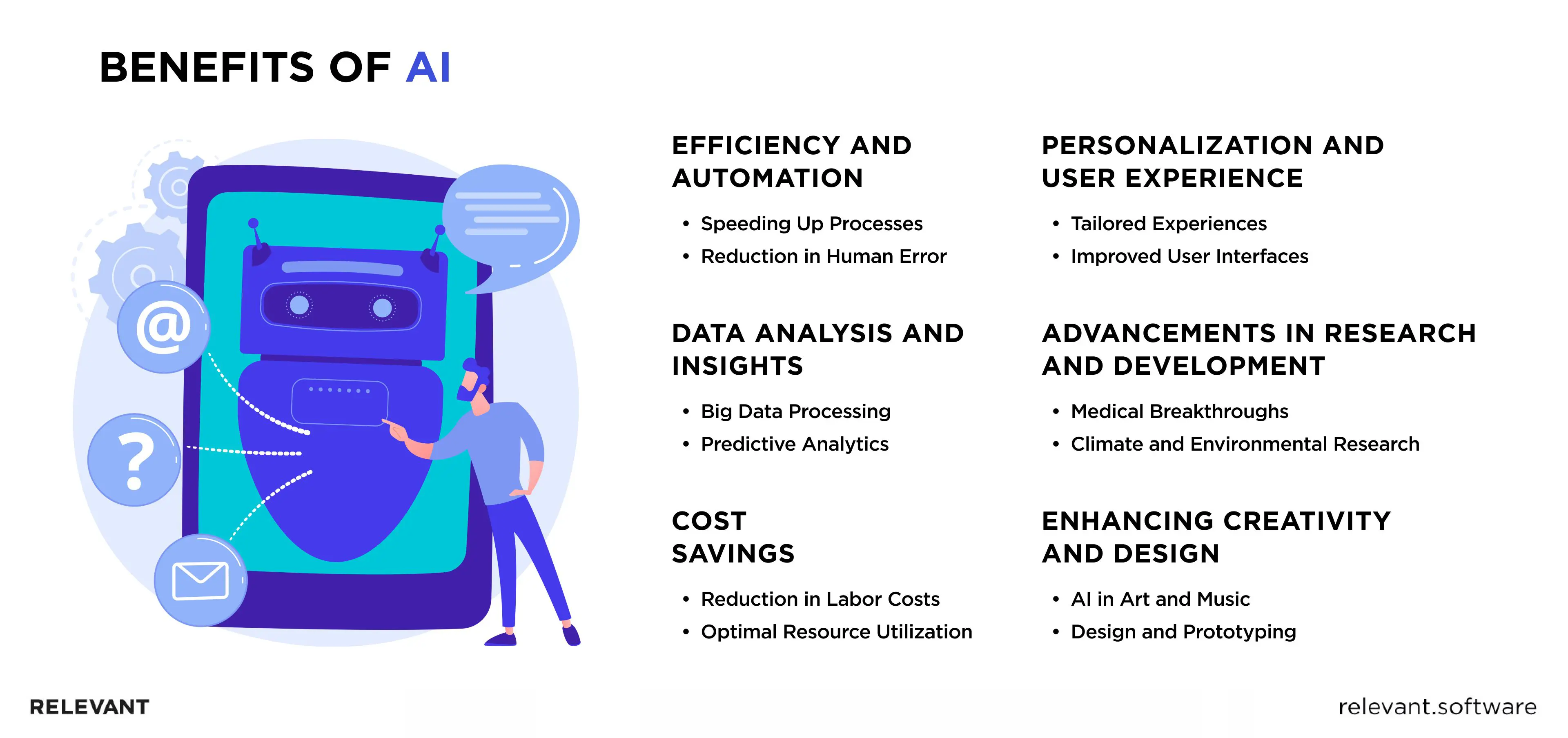What Are The Benefits of AI and How They Can Empower Your Business

Today’s machines can do more than just follow instructions; they learn, adapt, and often outperform humans. Such is the impact of artificial intelligence (AI), a profound innovation entirely transforming our world. From predicting disease outbreaks to composing symphonies, AI is weaving its way into every facet of life, painting a future filled with unimaginable improvements. But let’s be more specific – what are the benefits of AI exactly? What does this technology offer? Let’s start in order.
A Brief Overview of What AI is
Simply put, AI is the simulation of human intelligence processes by machines, primarily focusing on learning, problem-solving, and decision-making. It comprises a wide spectrum of techniques and approaches, along with:
from 25 countries outsourced software development to Relevant
We provide companies with senior tech talent and product development expertise to build world-class software.
- Machine learning: The algorithms learn from data without explicit programming, constantly improving their performance.
- Deep learning: Inspired by the human brain, these classes of machine learning algorithms excel at complex tasks like image recognition and language interpretation.
- Robotics: It deals with smart machines designed to engage with the physical environment.
- Computer vision: It empowers machines to see and decode the visual world.
- Natural language processing: This subset of AI helps understand and generate human language, enabling chatbots and voice assistants.
So, AI is rather a scope of tools and techniques with the potential to impact various aspects of our lives significantly.
What are the Benefits of AI?
AI, at its essence, is about creating software with capabilities often at a level that surpasses humans. Let’s look at all the opportunities that AI presents us.

Efficiency and Automation
AI shines brightest when it comes to boosting efficiency and automation. Its ability to process information and perform tasks at lightning speed unlocks several benefits such as:
Speeding Up Processes
- Data Analysis: AI can quickly go through huge amounts of data, finding important information that would take people years to uncover. This aids in market research, fraud detection, and scientific discovery.
- Repetitive Tasks: From data entry to document processing, AI automates tedious, time-consuming tasks with flawless consistency. Imagine payroll calculations completed in seconds or customer service inquiries handled instantly by chatbots.
- Decision-Making: AI models analyze complex factors and suggest optimal courses of action in real-time. This helps organizations make smart choices about how to use their resources, handle their inventory, and set their pricing strategies.
Reduction in Human Error
Humans are smart but prone to errors, especially in repetitive tasks. AI, however, minimizes mistakes by:
- Eliminating Fatigue and Boredom: Machines don’t get tired or lose focus, ensuring consistent accuracy even in monotonous tasks.
- Reducing Distractions: AI systems work in controlled environments, minimizing external influences that can lead to human error.
- Following Precise Instructions: AI algorithms follow programmed rules to the letter, eliminating the risk of misinterpretation or unintentional deviations.
By automating tasks and minimizing errors, AI acts as a powerful engine of efficiency, freeing up human resources for higher-level thinking and creative endeavors.
Data Analysis and Insights
Next, we explain to you what the benefits of AI are for decision-making. The strength of AI is how it digs into data to reveal secrets we’d otherwise miss. It turns huge, complex datasets into clear, useful insights, helping us make smarter decisions in all sorts of fields.
Big Data Processing
Traditional analysis methods crumble under big data enormity. AI, however, thrives on:
- Extracting Patterns and Trends: Even in the most complex, noisy datasets, AI identifies hidden patterns and correlations that humans might miss. This unveils customer behavior, market trends, and even scientific breakthroughs.
- Real-time Analysis: AI processes data streams in real-time, providing instant insights and enabling swift responses to changing situations. Imagine monitoring stock prices or tracking customer sentiment in real-time to adjust marketing strategies.
- Predictive Modeling: By analyzing historical data and identifying patterns, AI can predict future events with remarkable accuracy.
Predictive Analytics
AI doesn’t just analyze the past; it predicts the future. Through complex algorithms, AI can:
- Predict Customer Behavior: AI looks at what customers have bought before, how they browse, and their social media activity. It guesses what they might buy next, which helps companies offer personalized suggestions and create marketing that really hits the mark.
- Identify Risks and Opportunities: The AI tool can sift through financial data and market trends to anticipate potential risks and opportunities, enabling businesses to prepare for challenges and capitalize on emerging markets.
- Preventative Maintenance: AI can accurately predict future events by analyzing historical data and identifying patterns. These AI capabilities empower businesses to anticipate customer churn, optimize resource allocation, and prevent equipment failures.
Cost Savings
What are the benefits of AI for cost savings? First and foremost is its ability to help businesses to identify areas where they can cut costs or optimize spending.
Reduction in Labor Costs
Repetitive tasks that were once human-powered can now be handled by intelligent machines, leading to:
- Reduced headcount: For tasks like data entry, assembly line jobs, and customer service inquiries, AI can replace human workers, leading to immediate cost savings on salaries and benefits.
- Increased efficiency: Even when humans and AI collaborate, AI can significantly boost efficiency. Consider a customer service representative assisted by an AI chatbot that instantly handles basic inquiries, freeing the rep to focus on complex issues.
Optimal Resource Utilization
AI isn’t just about replacing people; it’s about using resources more intelligently. Consider these examples:
- Manufacturing: AI optimizes production processes, reduces waste, and minimizes energy consumption, leading to significant cost savings in material expenses and energy bills.
- Logistics: AI in transportation analyzes traffic patterns and optimizes delivery routes, reducing fuel consumption and transportation costs. They can also manage warehouse inventory more efficiently, minimizing storage costs and product loss.

Personalization and User Experience
Personalization, often unnoticed, has long been key in User Experience, growing with users’ rising expectations for convenience, ease, and speed in on-demand services. And artificial intelligence becomes an invisible part of this process.
Tailored Experiences
AI tailors interactions, recommendations, and even entire interfaces to individual preferences and needs, leading to a more satisfying and productive user journey.
- Predictive Recommendations: AI analyzes user data, purchase history, and online behavior to predict preferences and recommend products, content, or services that are likely to resonate. This boosts engagement and conversion rates, leading to happier customers and increased revenue.
- Dynamic Content: Websites and apps can adjust their content and layout based on individual user data. Imagine a travel website displaying flights and hotels tailored to your preferred destinations and budgets or a learning platform presenting lessons at your optimal pace and difficulty level.
Improved User Interfaces
AI isn’t just about the data behind the scenes; it’s also transforming how we interact with technology:
- Voice Assistants: This technology helps seamlessly interact with your devices through natural language. AI-powered voice assistants make technology accessible and intuitive, especially for visually impaired users or those who prefer hands-free interaction.
- Chatbots: These are tools powered by AI that can help customers at any time of the day. They can answer simple questions and sort out basic problems, making it easy for users to get help without having to wait on the phone.
- Adaptive Interfaces: AI can adapt user interfaces to unique needs and preferences. Think of a website that adjusts its font size and color scheme based on user settings or a screen reader that displays text based on reading speed.

Advancements in Research and Development
AI’s impact extends far beyond streamlining businesses and enhancing user experiences. It inspires research and development by opening the gates to pioneering discoveries in medicine and environmental science.
Medical Breakthroughs
The role of AI in healthcare is nothing short of phenomenal. Here are some key areas where AI is trending:
- Drug Discovery and Development: Here, AI uses big data – like genetic info, molecule details, and clinical trial results – to spot potential new drugs and figure out how well they might work. This speeds up the whole process of finding new medicines.
- Diagnosis and Personalized Medicine: AI algorithms can analyze medical images (like X-rays and MRIs) with superhuman accuracy, detecting diseases at earlier stages and enabling personalized treatment plans.
Climate and Environmental Research
The fight against climate change also benefits from the use of AI:
- Climate Modeling and Prediction: AI models analyze complex climate data to predict weather patterns, extreme events, and long-term climate trends with phenomenal accuracy. That enables us to prepare for natural disasters, optimize resource management, and develop effective climate mitigation strategies.
- Environment Solutions: AI algorithms help us understand and tackle environmental challenges like pollution, deforestation, and biodiversity loss. For example, AI can analyze satellite imagery to monitor deforestation patterns, optimize waste management systems, and identify sustainable energy solutions.
- AI-Driven R&D: AI designs new, environmentally friendly materials, develops personalized vaccines against emerging diseases, or even predicts future pandemics to prevent them before they even begin.
Enhancing Creativity and Design
AI extends beyond mere data analysis and task automation; it’s also advancing the frontiers of creativity and design.
AI in Art and Music
The creative spark of AI opens up new possibilities in the field of art and music:
- AI-generated artworks: Algorithms can create stunning visuals, from photorealistic landscapes to abstract compositions, pushing the boundaries of traditional art forms. Imagine AI generating personalized portraits or composing symphonies tailored to your mood.
- Musical compositions: AI can analyze and learn from existing music styles, generating original pieces that mimic or even innovate on existing genres. Imagine collaborating with AI to create a unique musical composition, blending your creative vision with its algorithmic prowess.
Design and Prototyping
The AI transformation has also affected the design and development process:
- Product Design: AI algorithms can analyze user data and market trends to suggest optimal product features and designs. Imagine AI generating hundreds of prototype designs based on your specifications, allowing you to iterate and find the perfect product solution quickly.
- Testing and Prototyping: AI can simulate real-world conditions and test product prototypes virtually, saving time and resources compared to traditional physical testing. Imagine testing a new car design in a simulated crash test or optimizing a wind turbine design through virtual wind tunnel simulations.
- Faster Innovation Cycles: By streamlining design and testing processes, AI empowers industries like automotive and fashion to innovate faster and bring better products to market quicker. This can lead to increased efficiency, reduced costs, and, ultimately, a wider range of affordable and high-quality products for consumers.

Addressing Key Concerns
While AI benefits to society are undeniable, concerns regarding its potential downsides also need to be addressed.
Job Displacements
It’s true that AI automation may lead to job losses in certain sectors. However, it’s important to consider the counter-arguments:
- New Job Creation: Technology creates vacancies in areas like AI development services, maintenance, data analysis, and ethical oversight. The key lies in reskilling and upskilling the workforce to adapt to the changing job landscape.
- Job Transformation: Many jobs will be transformed by AI, requiring a blend of human skills and AI expertise. Think of customer service representatives collaborating with AI chatbots or surgeons assisted by AI-powered surgical robots.
Ethical Concerns
Developing ethical guidelines and regulations for AI development is crucial. This involves collaboration between governments, researchers, businesses, and the public to ensure AI is used responsibly and benefits all.
- Data Privacy: It’s absolutely vital to ensure responsible data collection and use, protecting individual privacy and preventing misuse of personal information.
- Algorithmic Bias: If AI programs aren’t built and checked carefully, they can keep up the same biases we see in society. Developers must be focused on removing bias from the data and how the AI makes decisions to ensure everyone is treated fairly.
- Transparency and Explainability: AI needs to make decisions in a way that’s clear and easy to understand. This helps people trust AI more and ensures it can be held accountable.
Benefits of AI In Society: Concluding Thoughts
AI technology is neither a magic bullet nor a threat to humanity. It’s a powerful tool, and like any of them, its impact depends on how we build AI and use it. If we curb the power of AI and tackle its challenges thoughtfully, we can open up a future filled with opportunities for advancement, creativity, and a brighter world. If you are interested in AI development, contact us.


Hand-selected developers to fit your needs at scale! Let’s build a first-class custom product together.

